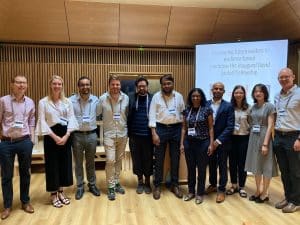




To be awarded a David Sackett Fellowship, individuals were asked to submit a provocative, bold and constructive abstract that aimed to make research evidence relevant, replicable and accessible to end-users, as outlined in the EBM Manifesto (Heneghan et al. 2017). Submissions could either describe a problem or describe novel research findings. We reached out to universities and medical schools across the world as well as international and national networks such as the Cochrane Collaboration, Students 4 Best Evidence and the National Institute of Health Research.
To be accepted, applicants must have been an early career researcher or patient. We received a total of 57 entries from 20 different countries, with an overall gender split of 51% female.
Adjudication of the submissions was completed by the Future Leaders Committee, which included representatives from The BMJ, the CEBM at the University of Oxford, and early career researchers, who each completed diversity training. The selection of scholars was based on a combination of the quality of submissions, gender and a representation of major continents.
As a David Sackett Fellow, awardees receive full delegate registration to attend EBMLive in Oxford and coverage for travel and accommodation expenses, a commonly reported barrier to conference attendance. Most importantly, Fellows are provided with an opportunity to meet like-minded early-career researchers, present their ideas and solicit feedback, attend sessions dedicated to supporting the development of early-career researchers and form life-long networks across the EBM community.
The launch of the David Sackett Fellowship was outlined in an editorial published in BMJ Evidence Based Medicine, “Developing future leaders in evidence-based medicine: the inaugural David Sackett Fellowship” to promote the creation of the scholarship in memory of David Sackett.

Yan Lou is an assistant professor at Kyoto University Graduate School of Medicine in Japan. She received her MD degree in China, and then practiced as a rheumatologist for three years. After witnessing how EBM had helped improve patient outcomes, Yan came to Japan to start a PhD course in epidemiology. She enjoys applying new evidence synthesis methods such as individual participant data network meta-analysis to help construct individual-level evidence. She conducts and collaborates in meta-epidemiological research to reveal potential problems in clinical studies that may cause bias or misinterpretation. Yan is also interested in how to facilitate evidence dissemination via visualization and how to incorporate patients’ value into decision-making.
Ms. Lou presented her idea on “Visualizing the Evolution of Evidence: Cumulative Network Meta-Analyses of New Generation Antidepressants in the Last 40 Years.” Her abstract is published here.

Umer Siddique is a psychiatry trainee (CT3) based in East London and coming up to the end of his core training. He will be applying for dual Specialty Training in General Adult + Older Adults Psychiatry. His particular interests include psychological therapies; personality pathologies; transition from CAMHS; the medico-legal interface; and cultural aspects of psychiatry.
Dr. Siddique presented his idea on “Adding evidence of the effects of treatments into relevant Wikipedia pages: a randomised trial.” His abstract is published here.

Uday Yadav is an early career Implementation scientist and his research interests include non-communicable diseases, global health, Indigenous health, primary health care, and evidence-based policy. Dr Yadav has implemented various public health programs and conducted research in Nepal, Bangladesh, Pakistan, India, and Australia. Currently, he holds a Research Fellow position at National Centre for Aboriginal and Torres Strait Islander Wellbeing Research, The Australian National University, Australia. Dr Yadav aims to address global health issues through the implementation of people-centered co-designed solutions and policy and advocacy with a special focus on unserved populations.
Dr. Yadav presented his idea on “Using Co-design Process to Develop an Integrated Self-management Intervention Program for COPD patients in Nepal.” His abstract is published here.

Kaitlyn Hair is a postdoctoral researcher at the University of Edinburgh working with the CAMARADES group. During her PhD, she developed automated evidence-synthesis pipelines for preclinical research and led collaborative systematic review and meta-analyses projects in animal models of Alzheimer’s disease. Her research interests are in improving the translational value of preclinical dementia research, and in developing, validating, and implementing automation technologies to accelerate meta-research.
Dr. Nair presented her idea on “‘Living’ evidence frameworks for in vivo animal research: towards translational evidence-based medicine.” Her abstract is published here.

Sathya Karunananthan holds a PhD in epidemiology from McGill University. She is an Assistant Professor in the Interdisciplinary School of Health Sciences at the University of Ottawa. Her research focuses on frailty and physical function in older persons, and the role of technology in improving access to healthcare. She is also actively involved in projects on systematic review methodology, meta-research, and healthcare knowledge translation. Her recent work includes the development of guidance for when to replicate systematic reviews.
Dr. Karunananthan presented her idea on “When should systematic reviews be replicated and when is it wasteful: a checklist and framework.” Her abstract is published here.

Gabriel Costa is an early DPhil student in Rio de Janeiro, Brazil. His interest in research goes back to when he was 16/17 years when he started reading scientific articles and is now a meta scientist who is honoured to attend this conference in honour of David L. Sackett at Oxford. (Prior to this, he had never left Latin America.) Gabriel has an interest in clinical epidemiology, pre-clinical research and how to reduce research waste and improve methodological rigor. He is a member of the Brazilian Reproducibility Initiative and recently updated the replicability of highly cited clinical research (his MSc’s thesis – poster at the conference). Without his coauthors, it would not be possible for him to attend the conference.
Mr. Costa presented his idea on “Outcome Reporting Bias in the Non-Pharmacological Literature – Diminishing Research Gaps and Improving Emerging Health Literature.” His abstract is published here.
Krish Bilimoria (Canada)
Krish Bilimoria is a 1st year medical resident in Internal Medicine at McGill University. He completed his Bachelor of Health Sciences (Global Health) at McMaster University and his medical degree at the University of Toronto. He also previously completed research across genetic epidemiology, global health impact investment, and global health ethics. His current academic interests are in diagnostic reasoning and his future clinical interests span General Internal Medicine & Critical Care.
Dr. Bilimoria presented his idea on “Meeting the Needs of a Diverse Readership: Towards Interactive Manuscripts.” His abstract is published here.
Trevor Treharne (Oxford, UK)
Trevor’s DPhil studies are focused on medicine in the media. He looks at how the media reports on health and medicine issues, including researching the tools and guidance that health journalists require when reporting on these issues. Previously, Trevor was a journalist for 14 years, including working as Deputy Head of News at Yahoo and the Sunday Times Fast Track. He has completed an MA in Bioethics from the University of Sydney and the MSc in Evidence-Based Health Care at the University of Oxford.
Mr. Treharne presented his idea on “The ‘Traffic Light Wheel’: a general reader visualisation tool to evaluate the quality of media news items on research evidence in EBM.” His abstract is published here.
Edward Li (Canada)
Edward Li is currently completing his nursing training at the University of New Brunswick and completed his Bachelor of Health Sciences at McMaster University, Canada. He has seen the applicability of research evidence to practice as a Project Associate for a local health administrative body, and as a co-director of Canadian health education media regarding stem cell donation. He looks forward to building on a foundation of research training to champion evidence-based, patient-centred clinical practice.
Mr. Li presented his idea on “Does End-User-Engaged Peer Review Improve the Relevance, Replicability, and Accessibility of Research Evidence?” His abstract is published here.